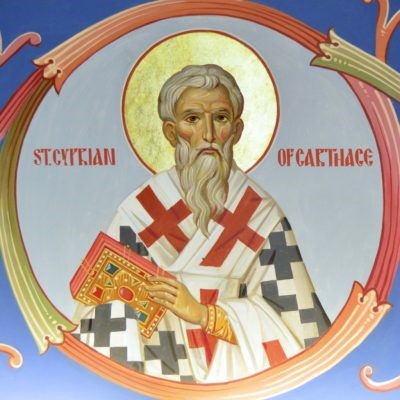Anastasios
We have seen previously, that the first centuries of Christian era were not times of peace and love. Indeed there were many fights, controversies, disputes to defend the Catholic faith. Often all these fights, controversies and disputes were done by converts to Catholicism, meaning people who certainly knew very well also the other side. This was the case of Cyprian, born in Carthage from a pagan noble family (around 210).
A Christian priest, Caecilius, converted him to Christianity and so he was baptized around 245. Then he became a priest and in 248 Bishop of Carthage. After his very rapid ascension to the episcopate he also attracted many jealousies that will follow him until the end of his life, a life marked by many persecutions against Christians. On 258, the persecution edict was proclaimed by Emperor Valerian, and Cyprian was asked to appear in front of the consul where his death sentence was announced. To this sentence he responded “Deo gratias” (“Thanks be to God”). He was beheaded on September 14, 258.
He was the author of several treatises: De idolorum vanitate, Testimonia adversa Judaeos ad Quirinum, De habitu virginum, De unitate ecclesiae, among others.
His teachings dealt with Church unity among other topics: “The spouse of Christ cannot be adulterous; she is uncorrupted and pure. She knows one home; she guards with chaste modesty the sanctity of one couch. She keeps us for God. She appoints the sons whom she has born for the kingdom. Whoever is separated from the Church and is joined to an adulteress, is separated from the promises of the Church; nor can he who forsakes the Church of Christ attain to the rewards of Christ. He is a stranger; he is profane; he is an enemy. He can no longer have God for his Father, who has not the Church for his mother. If anyone could escape who was outside the Ark of Noah, then he also may escape who shall be outside of the Church. The Lord warns, saying, ‘He who is not with me is against me, and he who gathers not with me scatters’ (Matthew 12:30). He who breaks the peace and the concord of Christ, does so in opposition to Christ; he who gathers elsewhere than in the Church, scatters the Church of Christ. The Lord says, ‘I and the Father are one’ (John 10:30); and again it is written of the Father, and of the Son, and of the Holy Spirit, ‘And these three are one’ (1 John 5:7). And does anyone believe that this unity which thus comes from the divine strength and coheres in celestial sacraments, can be divided in the Church, and can be separated by the parting asunder of opposing wills? He who does not hold this unity does not hold God’s law, does not hold the faith of the Father and the Son, does not hold life and salvation.” And this unity is guaranteed by the Primacy of the Bishop of Rome, the Vicar of Peter, the Supreme Pontiff.
Benedict XVI, many centuries later, said about Cyprian: “Cyprian teaches that it is precisely in the Lord’s Prayer that the proper way to pray is presented to Christians. And he stresses that this prayer is in the plural in order that ‘the person who prays it might not pray for himself alone. Our prayer,’ he wrote, ‘is public and common; and when we pray, we pray not for one, but for the whole people, because we the whole people, are one (De Dom. orat. [Treatise on the Lord’s Prayer], 8). Thus, personal and liturgical prayer seem to be strongly bound. Their unity stems from the fact that they respond to the same Word of God. The Christian does not say “my Father” but “our Father,” even in the secrecy of a closed room, because he knows that in every place, on every occasion, he is a member of one and the same Body. ‘Therefore let us pray, beloved Brethren,’ the Bishop of Carthage wrote, ‘as God our Teacher has taught us. It is a trusting and intimate prayer to beseech God with his own word, to raise to his ears the prayer of Christ. Let the Father acknowledge the words of his Son when we pray, and let him also who dwells within our breast himself dwell in our voice….’ ‘But let our speech and petition when we pray be under discipline, observing quietness and modesty. Let us consider that we are standing in God’s sight. We must please the divine eyes both with the position of the body and with the measure of voice….’ ‘Moreover, when we meet together with the brethren in one place, and celebrate divine sacrifices with God’s priest, we ought to be mindful of modesty and discipline – not to throw abroad our prayers indiscriminately, with unsubdued voices, nor to cast to God with tumultuous wordiness a petition that ought to be commended to God by modesty; for God is the hearer, not of the voice, but of the heart (non vocis sed cordis auditor est)’(3-4). Today too, these words still apply and help us to celebrate the Holy Liturgy well” (6 June 2007). Yes, the example of these holy fathers still is relevant for all of us, many centuries later.


 Follow
Follow


